Green Premiums Podcast
The Green Premium is the additional cost of choosing a clean technology over one that emits a greater amount of greenhouse gases. This podcast focuses on how green premiums can be reduced, by involving various stakeholders. A podcast by Johannes Frosteman. Check out my blog: greenpremiumspodcast.com!
Episodes
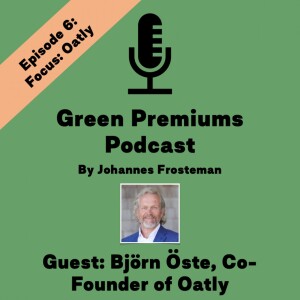
Wednesday Mar 23, 2022
Wednesday Mar 23, 2022
In Episode 6, I interview Björn Öste, one of the founders of oat milk-company Oatly. While Oatly was founded in the 90s, it started growing rapidly in 2014, mostly due to new milk formula and a new focus on innovative marketing. In 2021, it ran its first Super Bowl commercial, whereafter it did an IPO on Nasdaq at a valuation of $10 Billion.
Björn Öste grew up in Östersund in northern Sweden and spent the beginning of his career funding and exiting a company in the data security business. When his brother came up with the formula to make tasty oat milk, he decided to join the business as a co-founder and investor. The journey at Oatly was hugely successful, and since he left the board, his main entrepreneurial activity today is in Good Idea Drinks. They make functional carbonized drinks to keep blood sugar at stable levels among people with diabetes.
A Capstone-project by Johannes Frosteman, Minerva University. Check out my blog!
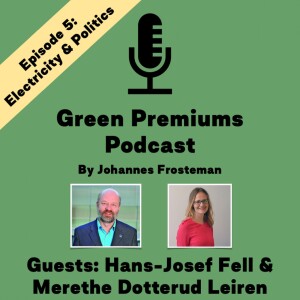
Monday Mar 21, 2022
Monday Mar 21, 2022
Episode 5 of the podcast focuses on a specific economic policy initially implemented in Germany: the feed-in tariff (FiT). The FiT incentivizes citizens to invest in renewable energy sources by providing an above-market price for producers. That price is achieved by letting electricity consumers pay an extra tariff on their electricity bills. In that sense, it works as a stick for people who are not investing in renewable energy and a carrot for those who do.
It was exciting to have one of the originators of the feed-in tariff in the podcast: Hans-Josef Fell. He was in the German parliament (Bundestag) from 1998-2013, representing the Green Party. Today, he is the president of the Energy Watch Group, a global network of scientists and parliamentarians focusing on clean energy. Mr. Fell is also considered one of the “fathers” of the Renewable Energy Act, of which FiT is a robust legislative framework. Mr. Fell is talking warmly about the FiT, so I brought Merethe Dotterud Leiren into the conversation to complement his view on the tariff. She is a political scientist focusing on green electricity policies, and she has written multiple papers on the FiT. Merethe Dotterud Leiren added some additional views on FiT. For example, she mentioned that the main issue with the feed-in tariff is that it is challenging to select which technologies to choose for the tariff.
A Capstone-project by Johannes Frosteman, Minerva University. Check out my blog!
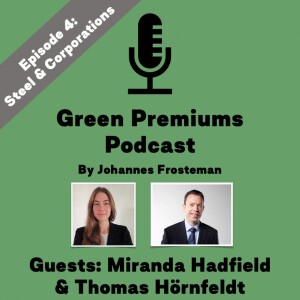
Wednesday Mar 16, 2022
Wednesday Mar 16, 2022
Before doing Episode 4 of the podcast, I watched this Ted talk by Jens Burchardt about how the green premium for many products is smaller than we may think. Mr. Burchardt and his team at Boston Consulting Group have been calculating what it would cost to produce products that are CO2-neutral. For an average European mid-size sedan with a cost of 30,000 euro, the green premium would only be 500 euros. The explanation is that the extra cost from the supply chain is low compared to the cost to the final consumer - only about 40% of all expenses come from suppliers. However, a large part of that goes to shipping and production. Ultimately, only 15% of the price of the car comes from the materials in it. That means that even if a company has to pay 50% more for the steel, it is only a fraction of the final sales price to the customer. The low extra cost is also something consumers could be willing to pay, but companies are held back because of price competition.
To evaluate the Ted talk, I reached out to Mr. Burchardt, who helped me contact BCG consultant Miranda Hadfield. We talked about the calculations that she and the team had been making and how companies will likely need pressure from legislators to shift more of their supply chains to come from sustainable sources. In the episode, I also talked with Thomas Hörnfeldt, who works at Hybrit, a company making CO2-neutral steel. For corporations to shift their sourcing, there need to be alternatives that can supply them with sustainable materials.
A Capstone-project by Johannes Frosteman, Minerva University. Check out my blog!
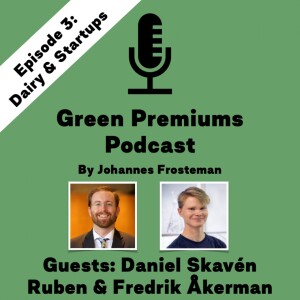
Friday Mar 11, 2022
Friday Mar 11, 2022
Episode 3 of the podcast is moving up one level from episode 2. It focuses on small, early-stage businesses instead of consumers. I interviewed Daniel Skavén Ruben, Head of Strategy and Special Projects at Stockeld Dreamery. Stockeld has launched a milk-free cheese and recently raised 20 million dollars from VC firms. If Daniel and his coworkers succeed in their mission, they can drive a change in a conservative sector that can drastically lower methane emissions. But not everybody wants to stop eating milk-based cheese. Therefore, it was also a great combination to have Fredrik Åkerman in the episode, CEO at Volta Greentech. Volta’s mission is to lower methane emissions from cows by feeding them seaweed that they grow in a factory facility.
A Capstone-project by Johannes Frosteman, Minerva University. Check out my blog!
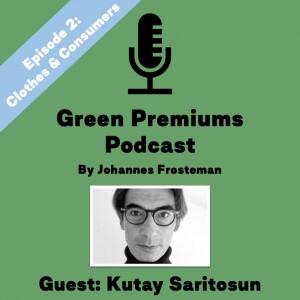
Friday Mar 04, 2022
Friday Mar 04, 2022
Fashion represents 10% of the world's greenhouse gas emissions and uses about 20% of our annual freshwater consumption. With an increasing middle class globally, it is essential to produce sustainable textiles without increasing prices. Or do consumers want to pay the green premium? Kutay Saritosun is Head of Marketing and Communication at BlueSign Technologies, helping companies such as Patagonia make their textile suppliers more sustainable. He guests the episode and explains how consumers can make active decisions to buy sustainably.
A Capstone-project by Johannes Frosteman, Minerva University. Check out my blog!
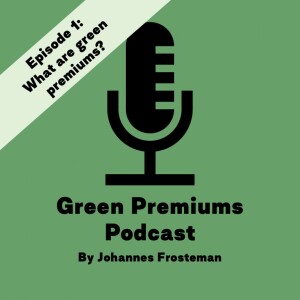
Monday Feb 28, 2022
Monday Feb 28, 2022
Bill Gates has talked warmly about "green premiums", as one of the fundamental tools to mitigate climate change. But what are green premiums? After a section with speeches by UN Secretary-General António Guterres, US Presidents Biden & Obama, and climate activist Greta Thunberg, I explain the context of the podcast series.
A Capstone-project by Johannes Frosteman, Minerva University. Check out my blog!

Your Title
This is the description area. You can write an introduction or add anything you want to tell your audience. This can help potential listeners better understand and become interested in your podcast. Think about what will motivate them to hit the play button. What is your podcast about? What makes it unique? This is your chance to introduce your podcast and grab their attention.
